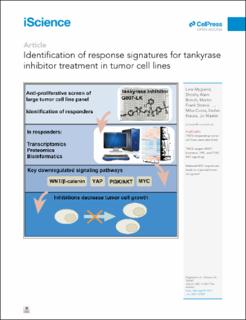Identification of response signatures for tankyrase inhibitor treatment in tumor cell lines
Mygland, Line; Mahmuda, Shoshy; Strand, Martin Frank; Olsen, Petter Angell; Aizenshtadt, Aleksandra; Lund, Kaja; Solberg, Nina; Lycke, Eric Maximilian; Thorvaldsen, Tor Espen; Espada, Sandra; Misaghian, Dorna; Page, Christian Magnus; Agafonov, Oleg; Nygård, Ståle; Chi, Nai-Wen; Lin, Eva; Tan, Jenille; Yu, Yihong; Costa, Mike; Krauss, Stefan; Waaler, Jo
Peer reviewed, Journal article
Published version
Permanent lenke
https://hdl.handle.net/11250/2833774Utgivelsesdato
2021Metadata
Vis full innførselSammendrag
Small-molecule tankyrase 1 and tankyrase 2 (TNKS1/2) inhibitors are effective antitumor agents in selected tumor cell lines and mouse models. Here, we characterized the response signatures and the in-depth mechanisms for the antiproliferative effect of tankyrase inhibition (TNKSi). The TNKS1/2-specific inhibitor G007-LK was used to screen 537 human tumor cell lines and a panel of particularly TNKSi-sensitive tumor cell lines was identified. Transcriptome, proteome, and bioinformatic analyses revealed the overall TNKSi-induced response signatures in the selected panel. TNKSi-mediated inhibition of wingless-type mammary tumor virus integration site/b-catenin, yes-associated protein 1 (YAP), and phosphatidylinositol-4,5-bisphosphate 3-kinase/AKT signaling was validated and correlated with lost expression of the key oncogene MYC and impaired cell growth. Moreover, we show that TNKSi induces accumulation of TNKS1/2-containing b-catenin degradasomes functioning as core complexes interacting with YAP and angiomotin proteins during attenuation of YAP signaling. These findings provide a contextual and mechanistic framework for using TNKSi in anticancer treatment that warrants further comprehensive preclinical and clinical evaluations.

